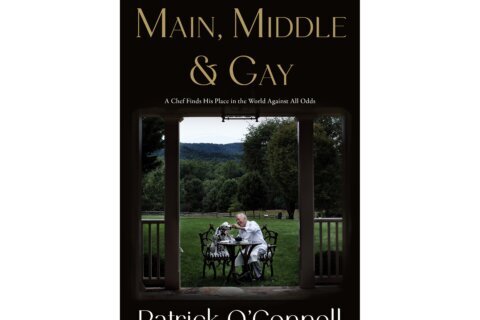WASHINGTON — It changed musicals forever, holding a bittersweet mirror up to society with a bohemian mantra: “The opposite of war isn’t peace. It’s creation.”
Now, the 20th anniversary tour of “RENT” wraps at D.C.’s National Theatre (Tuesday to Sunday), featuring iconic music, lyrics and book by the late Jonathan Larson, who first staged it at the New York Theatre Workshop in 1993 and died the night before its off-Broadway premiere in 1996.
“It’s celebrating how you live instead of how long,” actor Danny Harris Kornfeld said. “Artists have the responsibility to show the dark underbelly to the times we live in. Jonathan Larson did that, bringing people, lifestyles and diseases that weren’t being talked about into an approachable yet alarming and disarming context. People could sit and feel something, but also genuinely enjoy and celebrate.”
Based on Giacomo Puccini’s “La Bohème,” the story follows a year in the life (or 525,600 minutes) of seven artists struggling to make rent in the East Village of New York amid the AIDS epidemic of the late ’80s and early ’90s. The smash rock musical won four Tony Awards, including Best New Musical, shattering conventions while capturing human souls “living in America at the end of the Millennium.”
“I saw it when I was 10 in New York on Broadway,” said Kornfeld, who plays the role of Mark. “I was introduced to the CD beforehand, then my parents [took me to see the show]. That was the first Broadway show I ever saw actually, and the role of Mark was always on my radar ever since then.”
Mark is both the narrator and an aspiring filmmaker, whose film serves as the show’s framing device.
“What we see on stage is his film,” Kornfeld said. “He’s observing the interactions of his friends over the course of a year. (A) He’s single and all of his friends are in relationships, so it’s watching them go through the trials and tribulations that come with love. (B) He is not HIV-positive, so there’s that struggle of watching your [infected] friends live, not knowing how much longer you have with them.”
One such friend is Roger (Kaleb Wells), an HIV-positive musician afraid to fall for his latest flame, exotic dancer Mimi, played with verve by Skyler Volpe, who slays every railing and table on set.
“He has given up,” Wells told WTOP. “He has written himself off romantically, because anyone he gives his heart to, he could wind up killing [by giving them HIV]. … AIDS is a death sentence at this time. … [Notice] the juxtaposition of the way they deal with it. She says, ‘If I don’t have a lot of time, I’m gonna live my life fully,’ while he says, ‘If I don’t have a lot of time, I might as well just die now.'”
Not only is AIDS decimating their circle of friends, they’re also being financially squeezed by realtor Benny (Christian Thompson), who plans to evict the residents in order to build his new business. He offers to let them squat in their apartment for free if they cancel a gentrification protest organized by their pal Maureen (Katie Lamark), who literally “moons” while figuratively “jumping over the moon.”
“It’s so interesting to do the show 20 years later in a world where the Bennys of the world kind of won,” Wells said. “The idea of selling out in the ’80s and ’90s was such an incomprehensible thing. … Nowadays, it’s all about selling out; selling your product. … When the show was written, Benny was very much based on that kind of capitalist character that existed in the Manhattan real-estate field.”
While capitalism won in such Supreme Court cases as “Citizens United,” Larson won on the social front after the Supreme Court’s gay marriage ruling in 2015. While LGBT issues had been tackled in such plays as “Angels in America” and “The Normal Heart,” they were entirely new to musical theater.
“I know for myself it was my first introduction to homosexual couples and also interracial couples,” Kornfeld said. “It sparked a lot of questions, and my parents were good about not backing away from it. I remember I was like, ‘Mom, how do Angel and Collins know that they like each other? I mean, it’s two guys!’ And she was like, ‘They just do.’ I couldn’t understand that then, but now, of course, I do.”
David Merino and Aaron Harrington form the show’s most heartfelt interracial, gay couple as Angel and Collins, respectively. Merino wows the crowd, twirling in a Santa Claus outfit and jumping onto a table in high-heels, while Harrington brings tears streaming as he belts “I’ll Cover You” to the rafters.
“True art is saying or doing the things that no one else is doing,” Wells added. “In hindsight, you can say that was so easy, because many of the things in ‘RENT’ have become normalized, [but back then] nobody was talking about it. So for one person to say, ‘Hey, this is happening, my friends are dying and my friends are dealing with injustice racially and based on their sexual orientation,’ the fact that he did talk about that in such a groundbreaking but also approachable medium is very important.”
Not only did it change things socially, it changed things musically.
“It broke how people consumed musical theater,” Wells said. “[Before this], it would have been closer to ‘Hair,’ more contemporary musical theater. ‘RENT’ said, ‘Hey, there are so many people who need to hear this message who don’t go to musicals.’ … You have a lot of people now listening to this as an album of music that they enjoy that then gets the message across. It’s like ‘Hamilton’ today; you now have hip-hop artists covering a musical and [fans] who have never seen a show before in their lives.”
The rock-musical tunes have become the stuff of Broadway legend. How do you choose between the defiant “Rent,” the uplifting “Seasons of Love,” the lonely “One Song Glory,” the flirtatious “Light My Candle,” the rousing “Out Tonight,” the zany “Over the Moon,” the celebratory “La Vie Bohème,” the challenging “Take Me or Leave Me,” the heartbreaking “I’ll Cover You,” or the tear-jerking “Will I?”
“Everyone knows pretty much every song. Audiences applaud before songs even start because they know what’s coming,” Kornfeld said, to which Wells added, “It’s very daunting sometimes because they’re always one step ahead of you. They know what’s coming and they expect it to be done a certain way. … Our hope is that maybe you see something that you’ve never seen or heard before.”
This continued level of audience engagement is proof that “RENT” hasn’t aged one bit after 20 years.
“People always ask, ‘How is this different from the production we saw in 1996?’ And what I say to that is, ‘It’s the same production, but we are a new generation of actors and artists and we interpret it differently,'” Kornfeld said. “I think we are that perfect gateway of the old RENT-Heads to the new RENT-Heads. It’s coming to it with a modern-day sensibility and seeing what it means to us now.”
In a way, the line between audience and performer no longer exists.
“This production is for the fans, brought to you by the fans, because every single one of us on stage has been a fan of the show since before we can remember,” Wells said. “Everyone who comes to see it is taking part in that. It’s an almost religious experience because we’re all appreciating this work.”
Click here for more information. Listen to our full chat with Danny Harris Kornfeld and Kaleb Wells below:








